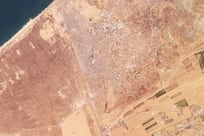While fans of the British comedy TV series Monty Python will know that "Nobody expects the Spanish Inquisition", the "Spanish acquisition" is nothing to fear.
In fact, it is a truism that more and more investors from the Arabian Gulf are expected to discover.
The European Union’s fifth-largest economy is tipped as a hotspot for investment from the Arab world, encouraged by strong growth in the first half of 2015 as well as the weak euro.
Spain was hit hard by the euro-zone crisis and its unemployment rate is still high. But with year-on-year GDP growth of 3.1 per cent in the second quarter – the fastest pace in eight years – Spain is emerging as one of this year’s star players in Europe.
Daniel Aguilon, the co-founder of HispaLux Consulting in Dubai, and Sven Behrendt, the managing director of the Geneva-based consultancy GeoEconomica, say the country is increasingly on Gulf investors’ radars.
Why are Gulf investors getting more interested in Spain?
Mr Behrendt: Spain has weathered the European sovereign debt crisis quite well and growth is returning, which makes it an attractive investment destination.
What kind of interest are you seeing in Gulf investment in the country?
Mr Aguilon: Both private and corporate investors have been targeting multiple sectors in Spain – including real estate, retail, energy and logistics – especially since the start of 2014, as the economy is recovering from the financial crisis.
The Gulf, and Arabic countries in general, and Spain have for centuries shared common culture and traditions, which facilitates the commercial and personal relations between both sides. The decrease of prices in real estate during the recession, between 35 and 40 per cent depending on the area, along with the current euro level at its lowest in history, have also contributed significantly to attracting new investors.
Spain was hit harder by the downturn than many other EU economies. Does that mean it is more vulnerable, or does its strong growth this year suggest an opportunity?
Mr Aguilon: Spain was certainly affected very negatively by the recession – especially outside the big cities – and is still struggling to get out of it.
However, GDP has increased significantly in Q1 and is forecast to increase by 3.1 per cent during 2015 as a whole.
From the real-estate side, prime assets in [Madrid and Barcelona] are always in high demand – regardless of the economy.
What are the challenges for individuals wanting to invest in Spain, compared with markets like the UK or Germany?
Mr Aguilon: Mainly the lack of understanding of the Spanish law, administration and banking systems.
At the same time, compared to Germany or the United Kingdom, if the investor does not speak Spanish [it] can be sometimes difficult to deal with government agencies without help.
business@thenational.ae
Follow The National's Business section on Twitter




